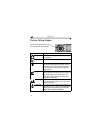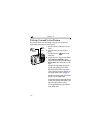
19
Chapter 2
5
Take a picture as usual (page 15).
PAS Mode Screen Options
Aperture—also referred to as f-number, controls the size of the lens opening,
which determines the depth of field. Smaller aperture settings keep both
foreground and background sharp, good for landscapes and well-lit
conditions. Larger aperture settings make the subject sharp and background
blurry, good for portraits and low-light conditions. The highest and lowest
aperture settings may be affected when using optical zoom.
Shutter speed—controls how long the shutter stays open. To prevent camera
shake, use a tripod for shutter speeds slower than 1/60 second.
Exposure compensation—controls how much light enters the camera,
good for controlling backlit scenes. If the picture is too light, decrease the
setting; if it’s too dark, increase the setting. See page 30 for setting exposure
compensation in other modes.
Settings Apply Only in PAS Mode
Settings you change while in PAS mode apply only to pictures taken while in
PAS mode. For example, if you change the Color Mode to Sepia while in PAS
mode, all other still modes (auto, sport, portrait, night, landscape, and close
up) retain the default setting of Color.
The settings, including Flash, remain active for PAS mode even when you
change modes or turn off the camera. This is the place to set and keep your
custom settings.
IMPORTANT: Use Reset (page 38) to return PAS mode to the default
settings.


















